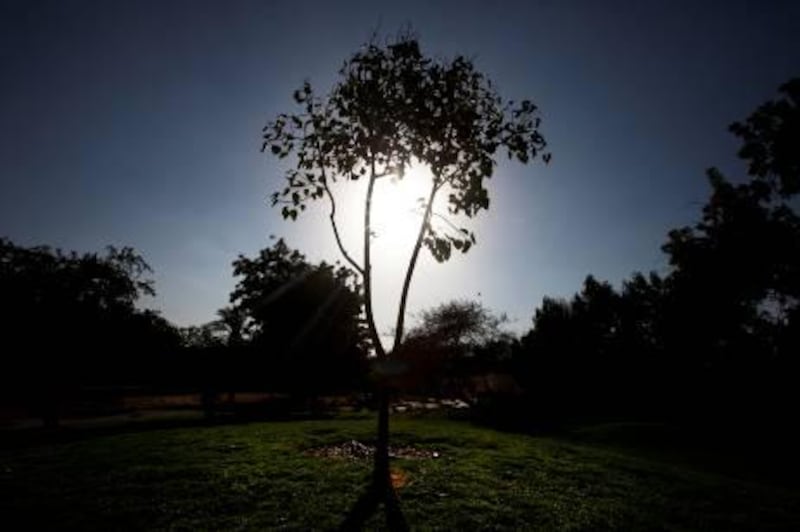ABU DHABI // The emirate can reach its ambitious target of generating seven per cent of electricity from renewable sources by 2020, experts said yesterday.
The target was announced two years ago before the World Future Energy Summit, a global conference held in the capital that gathers some of the world's most influential renewable industry players.
As organisers prepare for this year's summit, which begins on Monday, experts from the recently formed Emirates Solar Industry Association discussed how to bridge the gap between the current 12 megawatts (MW) of renewable energy capacity and a target of roughly 1,500MW that needs to come on line within nine years.
A new solar power plant, Shams1, developed by Masdar Power and currently under construction, will add another 100MW within the next year or so. Mohamed al Zaabi, the project's general manager, said: "The project is moving forward positively and Masdar is already planning to launch another 100MW solar project in the emirate this year.
"To meet Abu Dhabi's 2020 renewable energy goals, it is estimated that large-scale solar power plants such as Shams1 will deliver 1,000MW. "
"The additional 500MW will be produced from the solar roof programme, which will harness the power of the sun through small-scale solar installations on the roofs of homes and businesses throughout the emirate," Mr al Zaabi said.
Sami Khoreibi, the president and chief executive of Abu Dhabi-based Enviromena Power Systems, said government departments and leading developers were already incorporating photovoltaic panels on roofs or in outdoor shading devices.
He said around a dozen such small-scale projects are connected to the main electricity grid, although at this stage it is about players becoming comfortable with the technology. The trend will continue, he said, with dozens more due to be completed by the company this year.
"We are working on a number of rooftop projects right now," he said.
Dr Lisa Lamont, assistant professor at the electrical engineering department of Abu Dhabi's Petroleum Institute, said approaches that worked in other countries might not necessarily work here. For example, consumers in the UAE pay low energy prices because of generous government subsidies, while at the same time community awareness about the benefits of clean energy is low.
"I don't think we can just lift what has been done elsewhere," she said.
Solar power is just one form of clean energy. Wind, the power of ocean waves and currents can also be used to generate electricity. While Masdar is assessing whether to build a wind farm of up to 30MW on Sir Bani Yas Island, the sun is expected to play the largest part in meeting Abu Dhabi's clean energy needs.
Solar technologies will also feature heavily at the summit, at which many of the industry's leaders will discuss innovations in the field. Among them is Torresol Energy, a joint venture between Masdar and the Spanish engineering firm SENER, which is building three solar plants in Spain.
One of those, Gemasolar, is expected to start operation in April. Built at a cost of €300 million (Dh1.4 billion), the plant is the first in the world to use hot molten salt to generate power. The facility heats the salt to 600°C in a central tower, then uses it to turn water into steam, which is then used to produce electricity. Advantages of the technology are that electricity can be produced after the sun has set, and can also be produced according to demand.
"In summer, the plant can produce electricity 24 hours a day," said Pedro Mugarra, SENER managing director in Abu Dhabi.
Vahid Fotuhi, Middle East director for BP Solar, said the Emirates Solar Industry Association was calling for regulations for the sector, incentives in the form of special tariffs or power purchasing agreements, and a clearer understanding of which government department was responsible.
"Our willingness has not diminished, it is just that we have not seen much development over the past 18 months," he said. "We are just waiting to see."
Mr Fotuhi said he nevertheless remained optimistic that the renewable energy target would be met.
vtodorova@thenational.ae





